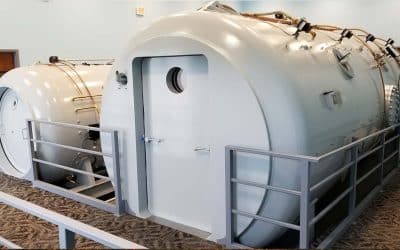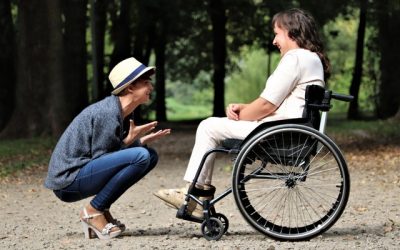Abstract Spinal cord injury (SCI) is a serious neurological disease without efficacious drugs. Anti-apoptosis and suppressing dendritic/synaptic degeneration in the anterior horn are essential targets after SCI. Previous studies found that hyperbaric oxygen therapy...
Key Spinal Cord Injury Research
Key Research for Hyperbaric Oxygen Therapy (HBOT) for Spinal Cord Injuries
Hyperbaric oxygen ameliorated the lesion scope and nerve function in acute spinal cord injury patients: A retrospective study.
This is a retrospective study to assess the therapeutic effect of hyperbaric oxygen (HBO) in early treatment of acute spinal cord injury (SCI) using magnetic resonance imaging (MRI) and electrophysiology in diagnosing. Forty acute SCI patients from Sun Yat-Sen Memorial Hospital who were assigned into HBO treatment were included during August 2013 to October 2014.The patients with adverse reactions or contraindications for HBO were assigned as controls. Both of two groups (HBO and Control) received medicine treatment with Urbason, GM-1 and mecobalamine after surgery. ASIA and the Frankel scores were used to evaluate the therapeutic effect of HBO at the 15th and 30th day after HBO treatment by using MRI and electrophysiology features. Significant therapeutic effect of HBO treatment on acute SCI patients was observed compared with the control group (P<0.05). Comparison for ASIA and Frankel scores showed that motor and neurological functions were significantly improved in HBO group at day 15 and day 30 post treatment. MRI images showed that the grade III injury in HBO group was significant lower than the control group. In comparison with the control, the peak of somatosensory evoked potential (SEP) and motor evoked potential (MEP) amplitude increased, the latency was shortened, and the conduction velocity of sensory nerve (SCV) and motor nerve (MCV) was significantly increased in the HBO group (P<0.05). HBO treatment has a great efficacy in acute SCI patients. HBO therapy at early stage of acute SCI is beneficiary to the recovery.
Relationship between clinical and radiologic findings of spinal cord injury in decompression sickness.
Decompression sickness may involve the central nervous system. The most common site is spinal cord. This study was conducted to determine the relationship between magnetic resonance(MR) imaging findings of spinal damage. We conducted a retrospective review of 12 patients (male=10, female=2) who presented with spinal cord symptoms. We investigated their clinical features, neurological findings and radiologic findings. The depth and bottom time of the dive were 34.5 meters (range 22-56) and 22.7 minutes (range 10-55) respectively. Most divers ascended within appropriate time frame as shown by the decompression tables. The most frequent initial symptoms were lower limb weakness (n=12), followed by sensory disturbances (n=10) and bladder dysfuction (n=5). The chief radiologic abnormalities were continuous (n=3), or non-continuous (n=5) high-signal intensity on T2-weighted images at posterior paramedian portion of the spinal cord, mainly thoracic level. There were no abnormal findings in the remaining four (4) patients, and they showed good prognosis. All patients were treated with hyperbaric oxygen therapy and some received high-dose dexamethasone. On discharge, five (5) patients had made a full recovery, seven (7) had some residual neurological sequelae, and all patients except one (1) regained normal bladder function. Spinal cord decompression sickness is a neurological emergency. Early recognition and treatment may minimize neurological damage. Initial normal finding in MR imaging was a good predictor for prognosis in spinal decompression sickness.
Hyperbaric oxygen therapy of spinal cord injury.
Spinal cord injury (SCI) is a complex disease process that involves both primary and secondary mechanisms of injury and can leave patients with devastating functional impairment as well as psychological debilitation. While no curative treatment is available for spinal cord injury, current therapeutic approaches focus on reducing the secondary injury that follows SCI. Hyperbaric oxygen (HBO) therapy has shown promising neuroprotective effects in several experimental studies, but the limited number of clinical reports have shown mixed findings. This review will provide an overview of the potential mechanisms by which HBO therapy may exert neuroprotection, provide a summary of the clinical application of HBO therapy in patients with SCI, and discuss avenues for future studies.
Effects of hyperbaric oxygen therapy on depression and anxiety in the patients with incomplete spinal cord injury (a STROBE-compliant article).
Little research has been done on the effects of hyperbaric oxygen (HBO) on depression and anxiety after spinal cord injury (SCI). The aim of this study was to investigate the effects of HBO on psychological problems and never function, especially on depression and anxiety in the patients with incomplete SCI (ISCI).Sixty patients with ISCI combined with depression and anxiety were randomly divided into HBO group (20 cases), psychotherapy group (20 cases), and conventional rehabilitation control group (20 cases). All patients received routine rehabilitation therapy. However, in HBO group and psychotherapy group, patients also received HBO and psychotherapy, respectively. These therapies lasted for a total of 8 weeks (once a day and 6 days per week). Before and after 8 weeks of treatment, depression and anxiety, nerve function, and activities of daily living were, respectively, evaluated according to Hamilton Depression (HAMD) scale, Hamilton Anxiety (HAMA) scale, American Spinal Injury Association score, and functional independence measure score in all patients.After 8 weeks of treatment, HAMD score was significantly lower in both HBO group and psychotherapy group than in control group (all P < .05), but there was no statistical difference in HAMD score between HBO group and psychotherapy group (P > .05). HAMA score was significantly lower in HBO group than in control group (P < .05), but there was no statistical difference in HAMA score between HBO group and psychotherapy group, and between psychotherapy group and control group (all P > .05). After 8 weeks of treatment, American Spinal Injury Association and functional independence measure scores were significantly higher in HBO group than in both psychological and control groups, and also higher in psychotherapy group than in control group (all P < .05).The effects of HBO on depression and anxiety are similar to that of psychotherapy. HBO can significantly improve nerve function and activities of daily living in the patients with ISCI, which either psychotherapy or routine rehabilitation therapy can not substitute.
Hyperbaric oxygen therapy improves local microenvironment after spinal cord injury.
Abstract: Clinical studies have shown that hyperbaric oxygen therapy improves motor function in patients with spinal cord injury. In the present study, we explored the mechanisms associated with the recovery of neurological function after hyperbaric oxygen therapy in...
Secondary injury mechanisms in traumatic spinal cord injury: a nugget of this multiply cascade
Abstract The pathophysiology of acute spinal cord injury (SCI) involves primary and secondary mechanisms of injury. Though both mechanisms are involved in the neurological dysfunction in SCI most research however has focused on understanding the pathophysiology of the...
Pathophysiology and pharmacologic treatment of acute spinal cord injury
Abstract Background context: The past three decades have witnessed increasing interest in strategies to improve neurologic function after spinal cord injury. As progress is made in our understanding of the pathophysiologic events that occur after acute spinal cord...
Acute spinal cord injury, part I: pathophysiologic mechanisms
Abstract Spinal cord injury (SCI) is a devastating and common neurologic disorder that has profound influences on modern society from physical, psychosocial, and socioeconomic perspectives. Accordingly, the present decade has been labeled the Decade of the Spine to...




